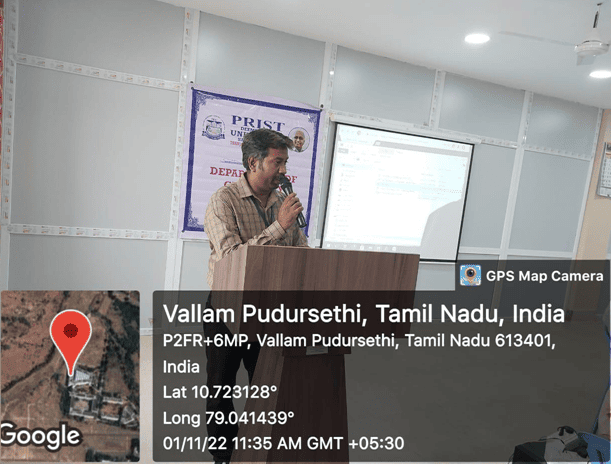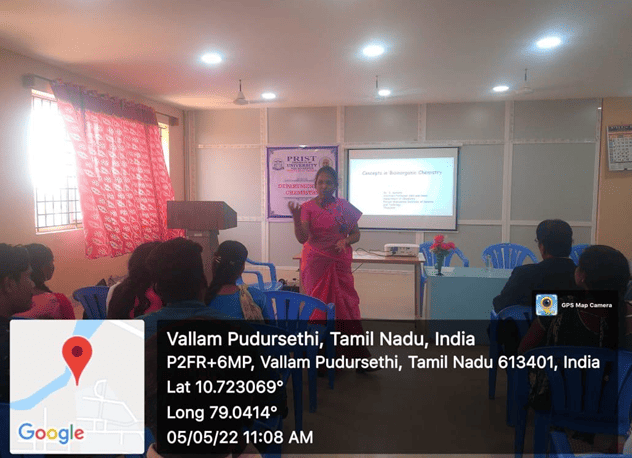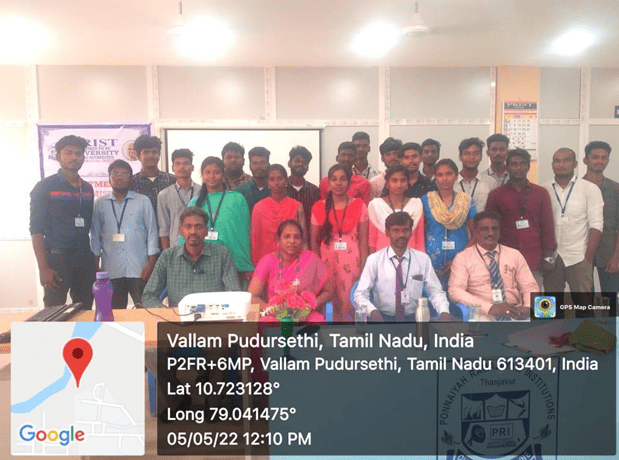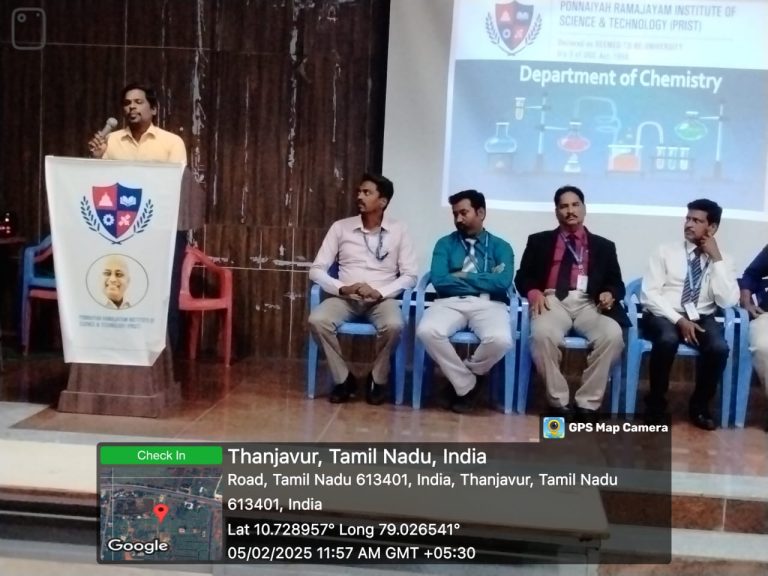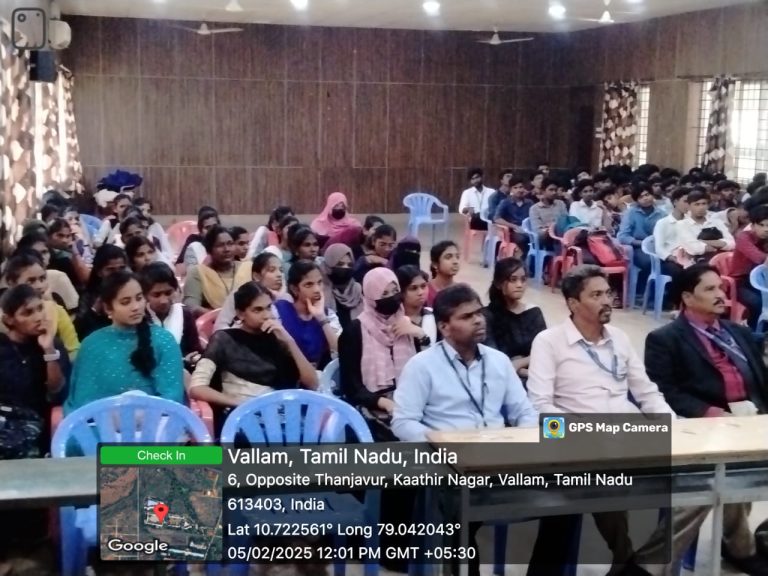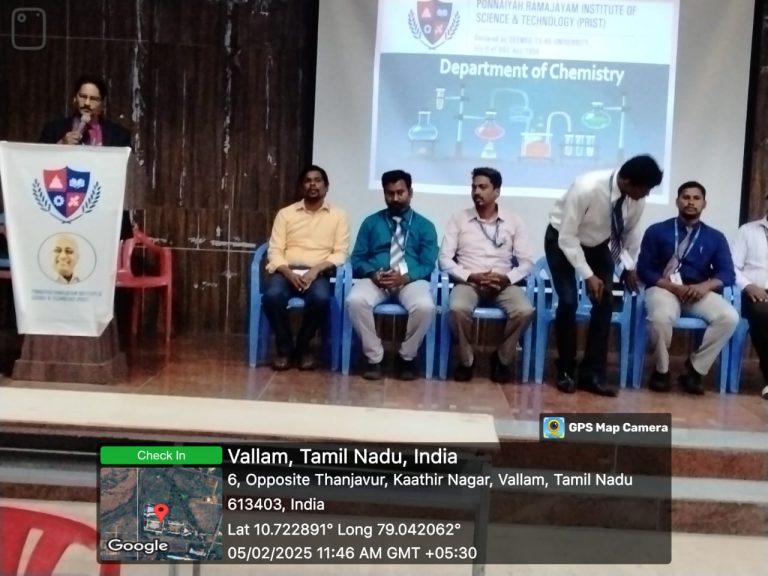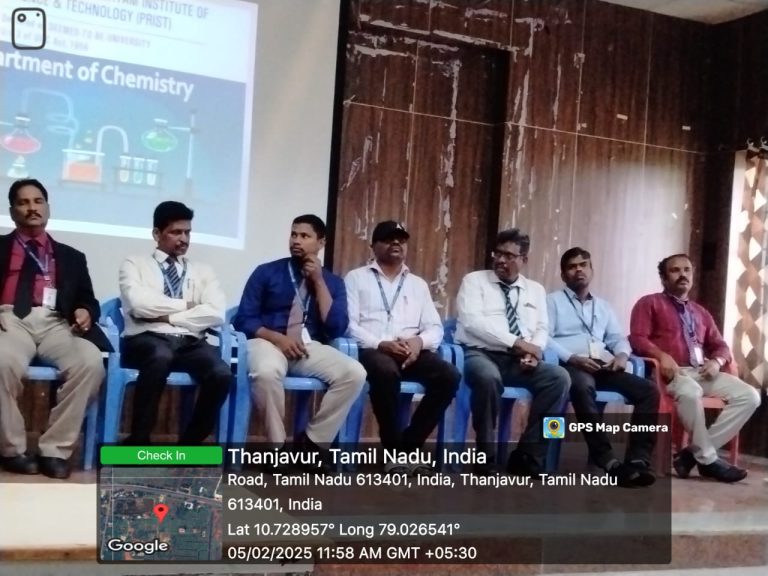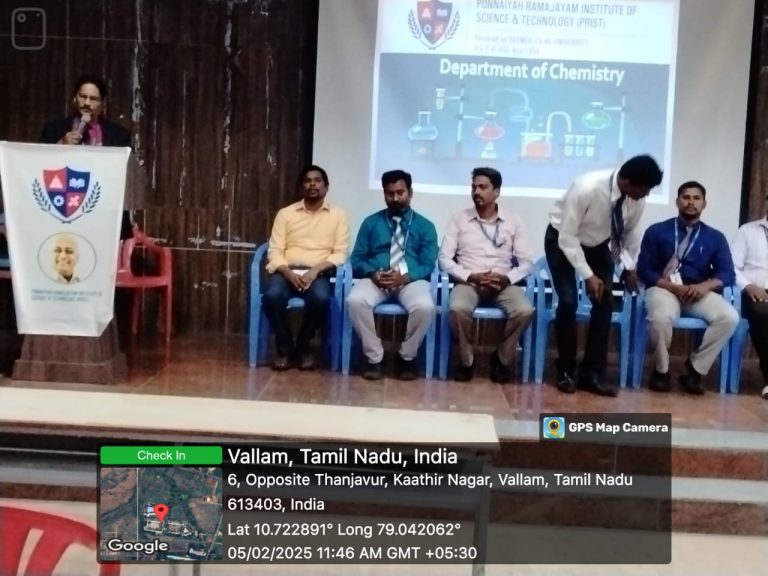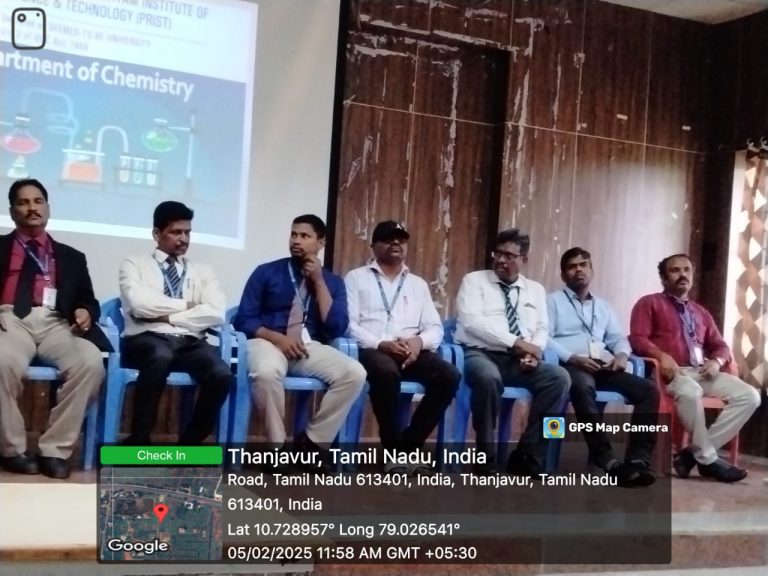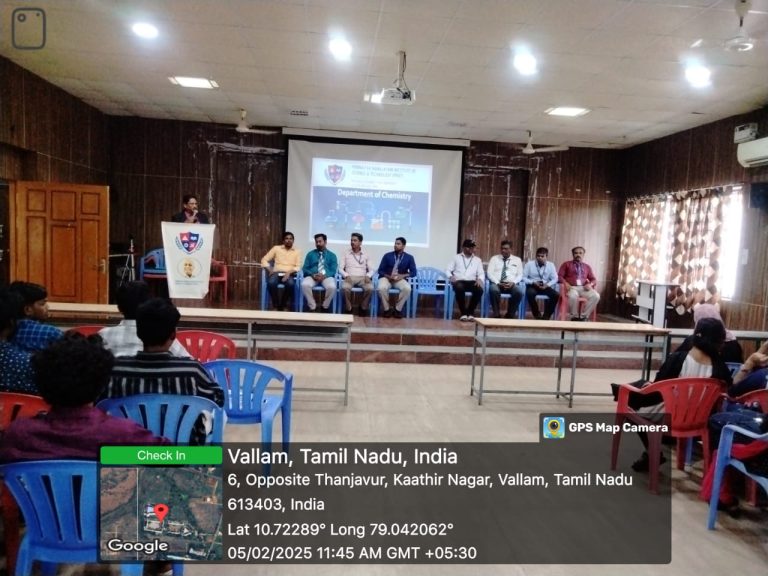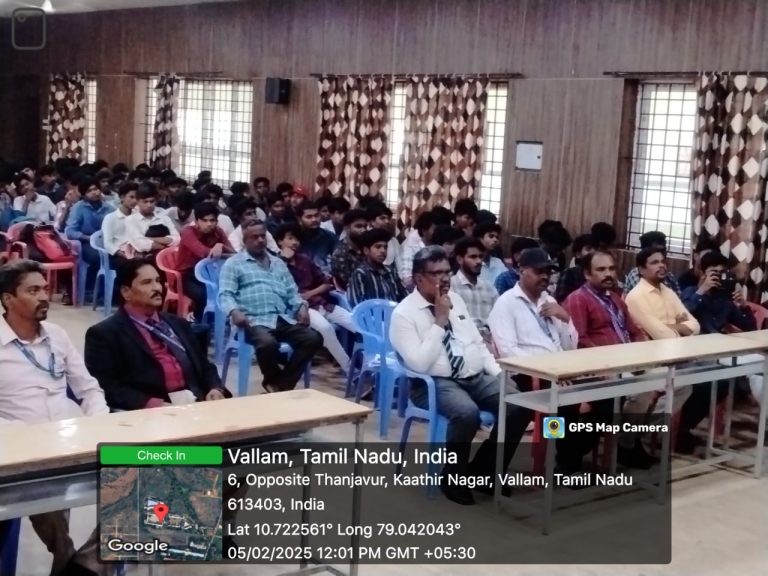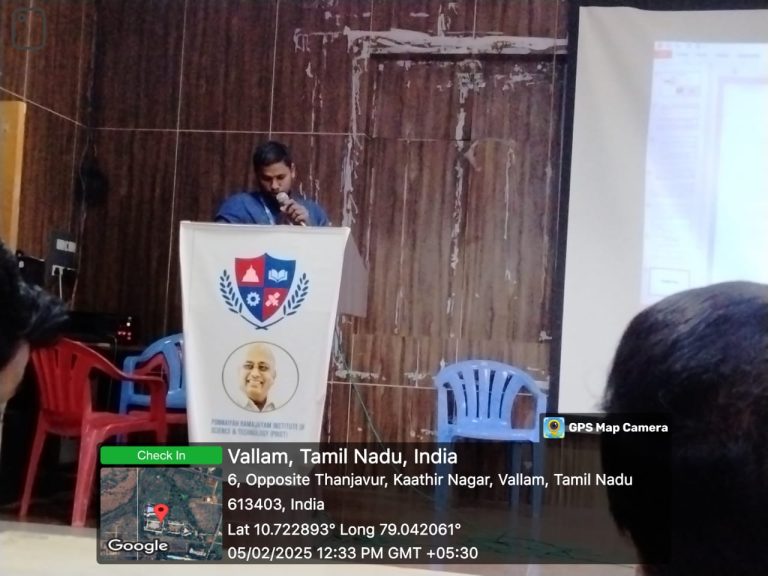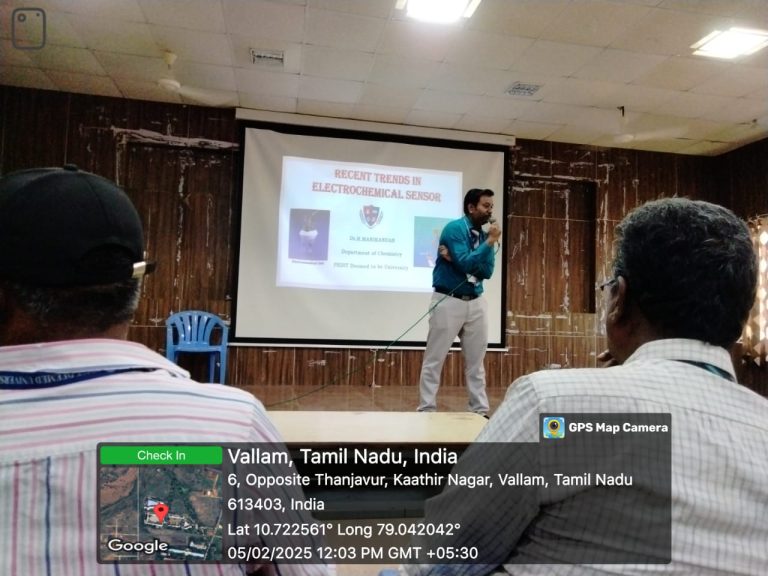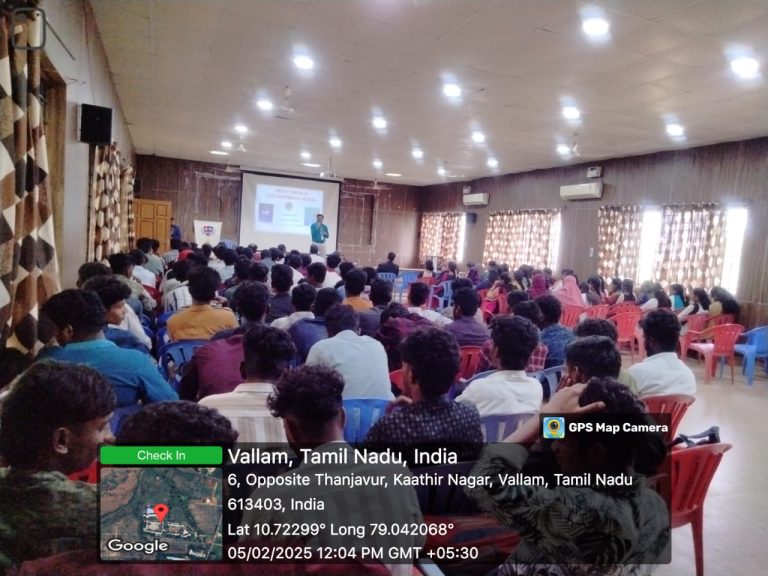The Department of Chemistry was established in 1995. The department offers Undergraduate (from 1995), Masters (from 2003) and Doctoral programs (from 2005). Since 2008, the department has emerged as full-fledged University department of PRIST Deemed to be University. The department has a dedicated team of staff members and distinguished faculty, trained at renowned Institutes from India and abroad. Along with teaching, the faculty members devote equal commitment to research. Also, they attract financial support for their research activities from both government and non-government bodies.
Faculty along with student teams organize seminars, conferences, workshops, that provide a platform for scientific inquiry among students and faculty from both PRIST and elsewhere.
Vision:
- To be a model department in imparting knowledge to the students.
- To be involved in current research applying innovative experimental techniques.
- To prepare the students face the challenges trending in the industry ecosystem.
Mission:
- Imparting to the student’s sound knowledge in chemistry with strong fundamentals.
- Provide impetus to research and development.
- Foster innovation in technological growth.
- Encourage entrepreneurship.
Strive to recognize and solve problems of mankind.
B.Sc. Chemistry (3-year Programme)
Programme Outcomes – POs
- To understand basic facts and concepts in Chemistry while retaining the exciting aspects of Chemistry so as to develop interest in the study of chemistry as a discipline.
- To develop the ability to apply the principles of Chemistry.
- To appreciate the achievements in Chemistry and to recognize the role of Chemistry in nature and in society.
- To develop problem solving skills.
- To be familiar with the emerging areas of Chemistry and their applications in various spheres of Chemical sciences and to apprise the students of its relevance in future studies.
- To develop skills in the proper handling of apparatus and chemicals.
- To be exposed to the different processes used in industries and their applications.
M.Sc. Chemistry (2-year Programme)
Programme Outcomes – POs
- Think critically and analyze chemical problems.
- Present scientific and technical information resulting from laboratory experimentation in both written and oral formats.
- Work effectively and safely in a laboratory environment
- Use technologies/instrumentation to gather and analyze data
- Work in teams as well as independently
- Apply modern methods of analysis to chemical systems in a laboratory setting
PhD Programme
The Ph.D. programme includes an integrated sequence of coursework and research in various branches of Chemistry. The scholars are considered based on the entrance examination conducted by PRIST.
Value Added Courses:
- Certificate Courses:
- Certificate course on Water Resource Management Pollution & Health
- Certificate course on Crystallization and Chromatography Techniques
- Certificate course on Molecular Structure Drawing Tool
- Certificate course on-UV-Visible, IR Spectroscopic Instrumentation and Separation Techniques
- Certificate course on Drug Design
More information on admission to all the above programmes may be had at (www.prist.ac.in )
Serial Number | NAME OF THE FACULTY MEMBER | DESIGNATION | Qualifications |
1) | Dr. M. Jerome ruzario | Professor | M.Sc., M.Phil., MS., Ph.D., |
2) | Dr.R.Manikandan | Professor | M.Sc., M.Phil., Ph.D., |
3) | Dr. J.s. Nirmal ram | Associate Professor | M.Sc., M.Phil., Ph.D., |
4) | Dr. D. Chinnaraja | Associate Professor | M.Sc., M.Phil., Ph.D., |
5) | Dr. M. Surendra varma | Associate Professor | M.Sc., M.Phil., Ph.D., |
6) | Dr.G.Anburaj | Assistant Professor | M.Sc., M.Ed., Ph.D., |
7) | Dr.P.Juliat marry | Assistant Professor | M.Sc., M.Phil., Ph.D., |
8) | Ms.V.Abarna | Assistant Professor | M.Sc., M.Phil., |
9) | Prof.Mr.Teanish raja | Assistant Professor | M.Sc., M.Phil., |
10) | Dr.C.Karthikeyan | Assistant Professor | M.Sc., M.Phil., Ph.D., |
11) | Dr.A.Sharmila banu | Assistant Professor | M.Sc., M.Phil., Ph.D., |
12) | Prof.M.Tamilzhselven | Assistant Professor | M.Sc., M.Phil., |
13) | Prof.Mr.A.S Prabakaran | Assistant Professor | M.Sc., M.Phil., |
Attributes of a Chemistry Graduate
Attributes of chemistry graduate under the outcome-based teaching-learning framework may encompass the following:
- Core competency: The chemistry graduates are expected to know the fundamental concepts of chemistry and applied These fundamental concepts would reflect the latest understanding of the field, and therefore, are dynamic in nature and require frequent and time-bound revisions.
- Communication skills: Chemistry graduates are expected to possess minimum standards of communication skills expected of a science graduate in the country. They are expected to read and understand documents with in-depth analyses and logical arguments. Graduates are expected to be well-versed in speaking and communicating their idea/finding/concepts to wider audience.
- Critical thinking: Chemistry graduates are expected to know basics of cognitive biases, mental models, logical fallacies, scientific methodology and constructing cogent scientific arguments.
- Psychological skills: Graduates are expected to possess basic psychologicalskills required to face the world at large, as well as the skills to deal with individuals and students of various sociocultural, economic and educational levels. Psychological skills may include feedback loops, self-compassion, self- reflection, goal-setting, interpersonal relationships, and emotional management.
- Problem-solving: Graduates are expected to be equipped with problem-solving philosophical approaches that are pertinent across the disciplines;
- Analytical reasoning: Graduates are expected to acquire formulate cogent arguments and spot logical flaws, inconsistencies, circular reasoning etc.
- Research-skills: Graduates are expected to be keenly observant about what is going on in the natural surroundings to awake their curiosity. Graduates are expected to design a scientific experiment through statistical hypothesis testing and other a priori reasoning including logical deduction.
- Teamwork: Graduates are expected to be team players, with productive co- operations involving members from diverse socio-cultural backgrounds.
- Digital Literacy: Graduates are expected to be digitally literate for them to enroll and increase their core competency via e-learning resources such as MOOC and other digital tools for lifelong learning. Graduates should be able to spot data fabrication and fake news by applying rational skepticism and analytical reasoning.
- Moral and ethical awareness: Graduates are expected to be responsible citizen of India and be aware of moral and ethical baseline of the country and the world. They are expected to define their core ethical virtues good enough to distinguish what construes as illegal and crime in Indian constitution. Emphasis be given on academic and research ethics, including fair Benefit Sharing, Plagiarism, Scientific Misconduct and so on.
- Leadership readiness: Graduates are expected to be familiar with decision- making process and basic managerial skills to become a better leader. Skills may include defining objective vision and mission, how to become charismatic inspiring leader and so on.
Program Learning Outcomes
The student graduating with the Degree B.Sc (Honours) Chemistry should be able to
- Core competency: Students will acquire core competency in the subjectChemistry, and in allied subject areas.
- Systematic and coherent understanding of the fundamental concepts in Physical chemistry, Organic Chemistry, Inorganic Chemistry, Analytical Chemistry and all other related allied chemistry subjects.
- Students will be able to use the evidence based comparative chemistry approach to explainthe chemical synthesis and analysis.
- The students will be able to understand the characterization of
- Students will be able to understand the basic principle of equipment, instruments used in the chemistry laboratory.
- Students will be able to demonstrate the experimental techniques and methods of their area of specialization in Chemistry.
- Disciplinary knowledge and skill: A graduate student is expected to be capable of demonstrating comprehensive knowledge and understanding of both theoretical and experimental/applied chemistry knowledge in various fields of interest like Analytical Chemistry, Physical Chemistry, Inorganic Chemistry, Organic Chemistry, Material Chemistry, etc. Further, the student will be capable of using of advanced instruments and related soft-wares for in-depth characterization of materials/chemical analysis and separation technology.
- Skilled communicator: The course curriculum incorporates basics and advanced training inorder to make a graduate student capable of expressing the subject through technical writing as well as through oral presentation.
- Critical thinker and problem solver: The course curriculum also includes components thatcan be helpful to graduate students to develop critical thinking ability by way of solving problems/numerical using basic chemistry knowledge and concepts.
- Sense of inquiry: It is expected that the course curriculum will develop an inquisitive characteristic among the students through appropriate questions, planning and reporting experimental
- Team player: The course curriculum has been designed to provide opportunity to act as teamplayer by contributing in laboratory, field based situation and industry.
- Skilled project manager: The course curriculum has been designed in such a manner as to enabling a graduate student to become a skilled project manager by acquiring knowledge about chemistry project management, writing, planning, study of ethical standards and rules and regulations pertaining to scientific project operation.
- Digitally literate: The course curriculum has been so designed to impart a good working knowledge in understanding and carrying out data analysis, use of library search tools, and use ofchemical simulation software and related computational work.
- Ethical awareness/reasoning: A graduate student requires to understand and develop ethical awareness/reasoning which the course curriculum adequately provide.
- Lifelong learner: The course curriculum is designed to inculcate a habit of learning continuously through use of advanced ICT technique and other available techniques/books/journals for personal
academic growth as well as for increasing employability opportunity.
Course Learning Outcomes
The course learning outcomes are aligned with program learning outcomes but these are specific-to- specific courses offered in a program. The course level learning shall be reflected as program level learning. The core courses shall be the backbone of this framework whereas discipline electives, generic electives and skill enhancement courses would add academic excellence in the subject together with multi- dimensional and multidisciplinary approach.
In course learning outcomes, the student will attain subject knowledge in terms of individual course as well as holistically. The example related to core courses and their linkage with each other is stated below:
CORE COURSES (CC) | ||||||||||||||
Programme Outcomes | CC 1 | CC 2 | CC 3 | CC 4 | CC 5 | CC 6 | CC 7 | CC 8 | CC 9 | CC 10 | CC 11 | CC 12 | CC 13 | CC 14 |
Core competency | 0 | 0 | 0 | 0 | 0 | 0 | 0 | 0 | 0 | 0 | 0 | 0 | 0 | 0 |
Critical thinking | 0 | 0 | 0 | 0 | 0 | 0 | 0 | 0 | 0 | 0 | 0 | 0 | 0 | 0 |
Analytical reasoning | 0 | 0 | – | 0 | 0 | 0 | – | – | 0 | 0 | – | – | 0 | 0 |
Research- skills | – | – | – | – | 0 | – | 0 | 0 | 0 | 0 | 0 | 0 | 0 | 0 |
Team work | 0 | 0 | 0 | 0 | 0 | 0 | 0 | 0 | 0 | 0 | 0 | 0 | 0 | 0 |
Discipline elective Courses (DEC)/Discipline Specific Elective (DSE) | |||||||
Programme Outcomes | DSEA2 | DSEB1 | DSEA3 | DSEB4 | |||
Additional Academic Knowledge | 0 | 0 | 0 | 0 | |||
Problem-solving | 0 | – | 0 | 0 | |||
Additional analytical skills | 0 | 0 | – | 0 | |||
Additional Research skills | 0 | 0 | 0 | 0 | |||
Skill Enhancement Course(SEC) | |||||||
Programme Outcome s | SECA2 | SECB3 | |||||
Additional Knowledge enhancement | 0 | 0 | |||||
Exposure beyond discipline | 0 | 0 | |||||
Analytical reasoning | 0 | – | |||||
Digital Literacy | 0 | 0 | |||||
Moral and ethical awareness | – | – | |||||
The core courses would fortify the students with in-depth subject knowledge concurrently; the discipline specific electives will add additional knowledge about applied aspects of the program as well as its applicability in both academia and industry. Generic electives will introduce integration among various interdisciplinary courses. The skill enhancement courses would further add additional skills related to the subject as well as other than subject. In brief the student graduated with this type of curriculum would be able to disseminate subject knowledge along with necessary skills to suffice their capabilities for academia, entrepreneurship and Industry.
Course Learning Outcomes(CLO)
Core Courses (CC)
CC1: INORGANIC CHEMISTRY-1 & ORGANIC CHEMISTRY-1A
(Credits:06, Theory-04, Practicals-02)
Course learning outcome (COs)
On completion of this course, the students will be able to understand:
Learning objective:
- Atomic theory and its
- Learning scientific theory of atoms, concept of wave
- Acid-Base concepts and different
- Oxidation-Reductions, qualitative idea on electroanalytical techniques
- Solubility and solubility product, common ion effect
- Basic of organic molecules, structure, bonding, reactivity and reaction
- Understanding hybridization and geometry of atoms, 3-D structure of organic molecules, identifying chiral centers.
- Reactivity, stability of organic molecules, structure,
- Electrophile, nucleophiles, free radicals, electronegativity, resonance, and intermediates along the reaction pathways.
- Mechanism of organic reactions (effect of nucleophile/leaving group, solvent), substitution vs.
CC2: PHYSICAL CHEMISTRY-1 & ORGANIC CHEMISTRY-1B
(Credits:06, Theory-04, Practicals-02) Learning objective:
- Understanding Kinetic model of gas and its
- Maxwell distribution, mean-free path, kinetic
- Behaviour of real gases, its deviation from ideal behaviour, equation of state, isotherm, and law of corresponding states
- Liquid state and its physical properties related to temperature and pressure variation
- Chemical kinetics: type of reactions, determination of rate, theories of reaction rate, steady state approximation.
- Catalyst – mechanism, acid base catalysis, enzyme catalysis
- Understanding the basics of chemical kinetics: determination of order, molecularity, and understanding theories of reaction rates, determination of rate of opposing/parallel/chain reactions with suitable examples, application of steady state kinetics, Steady-state approximation
- Catalyst – mechanism of catalytic action, enzyme
- Stereochemistry of organic molecules – conformation and configuration, asymmetric molecules and
- Reactivity, stability of organic molecules, structure,
- Electrophile, nucleophiles, free radicals, electronegativity, resonance, and intermediates along the reaction
- Understanding hybridization and geometry of atoms, 3-D structure of organic molecules, identifying chiral centers.
CC3: ORGANIC CHEMISTRY
(Credits: 06, Theory-04, Practicals-02) Course learning outcome(COs)
On completion of this course, the students will be able to understand:
Learning objective:
- Basic uses of reaction
- Name reactions, uses of various reagents and the mechanism of their
- Organic chemistry reactions and reaction
- Mechanism of organic reactions (effect of nucleophile/leaving group, solvent), substitution vs. elimination.
- Stereochemistry of organic molecules – conformation and configuration, asymmetric molecules and nomenclature.
CC4: INORGANIC CHEMISTRY
(Credits:06, Theory-04, Practicals-02)
Course learning outcome (COs)
On completion of this course, the students will be able to understand:
Learning objective:
- Characterize bonding between atoms, molecules, interaction and energetics (ii) hybridization and shapes of atomic, molecular orbitals, bond parameters, bond- distances and energies.
- Valence bond theory incorporating concepts of hybridization predicting geometry of
- Importance of hydrogen bonding, metallic
- Characterize bonding between atoms, molecules, interaction and energetics (ii) hybridization and shapes of atomic, molecular orbitals, bond parameters, bond- distances and energies.
- Defining isotopes, isobar and Separation and uses of isotopes. Nuclear stability, nuclear models.
- Radioactivity: learning different nuclear phenomenon, both natural and Fission and fusion reaction, determination of age of rock, radio carbon dating.
CC5: PHYSICAL CHEMISTRY
(Credits: 06, Theory-04, Practicals-02)
Course learning outcome (COs)
On completion of this course, the students will be able to understand:
Learning objective:
- Laws of thermodynamics and
- Partial molar quantities and its
- Dilute solution and its
- Understanding the concept of system, variables, heat, work, and laws of
- Understanding the concept of heat of reactions and use of equations in calculations of bond energy, enthalpy,
- Understanding the concept of entropy; reversible, irreversible processes. Calculation of entropy using 3nd law of thermodynamics.
- Understanding the application of thermodynamics: Joule Thompson effects, partial molar
- Understanding theories/thermodynamics of dilute
- Basic principle of laws of
- Understanding about electrodes, chemical cells and their function, EMF measurement
- Understanding about potentiometric titrations and their
- Electrolytes and electrolytic dissociation, salt hydrolysis and acid-base
- Ionic equilibria – electrolyte, ionization, dissociation
- Salt hydrolysis (acid-base hydrolysis) and its application in
CC6-INORGANIC CHEMISTRY
(Credits:06, Theory-04, Practicals-02)
Course learning outcome (COs)
On completion of this course, the students will be able to understand:
Learning objective:
- Chemistry of noble
- Inorganic polymers and their
- Chemistry of noble gases and their compounds; application of VSEPR theory inexplaining structure and bonding.
- Understanding chemistry of inorganic polymers, their structures and
- Coordination compounds – its nomenclature, theories,
- Elements in periodic table; physical and chemical characteristics,
- Physical and chemical characteristics of elements in various groups and periods
according to ionic size, charge, etc. and position in periodic table.
- Structure, bonding of s and p block materials and their oxides/compounds.
CC7-ORGANIC CHEMISTRY
(Credits: 06, Theory-04, Practicals-02) Course learning outcome (COs)
On completion of this course, the students will be able to understand:
Learning objective:
- Organometallic compounds and their
- Organic chemistry reactions and reaction
- Name reactions, uses of various reagents and the mechanism of their
- Use of reagents in various organic transformation
CC8: ORGANIC CHEMISTRY
(Credits: 06, Theory-04, Practicals-02) Course learning outcome (COs)
On completion of this course, the students will be able to understand
Learning objective:
- Organic chemistry reactions and reaction
- Use of reagents in various organic transformation
- Structure identification through IR, NMR and Mass spectroscopic
- Heterocyclic compounds and their
- Nitrogen containing functional groups and their
- Understanding the reactions and mechanisms of diazonium
- Understanding reactions and reaction mechanism of nitrogen containing functional
CC9: PHYSICAL CHEMISTRY
(Credits:06, Theory-04, Practicals-02)
Course learning outcome (COs)
On completion of this course, the students will be able to understand:
Learning objective:
- Phases, components, Gibbs phase rule, Phase diagrams and applications, colligative properties
- Understanding phases, components, Gibb’s phase rule and its applications, construction of phase diagram of different systems, the application of phase diagram.
- Calculation of lattice
- Solids, lattice parameters – its calculation, application of symmetry, solid characteristics of simple salts
- Foundation of quantum Mechanics, beginning of quantum mechanics, wave function, concept of operators, Particle in a box, Schrodinger equation
CC10: INORGANIC CHEMISTRY
Course learning outcome (COs)
On completion of this course, the students will be able to understand:
Learning objective:
- Coordination compounds – d-orbital splitting in
- Understanding the nomenclature of coordination compounds/complexes, Molecular orbital theory, d- orbital splitting in tetrahedral, octahedral, square planar complexes,chelate effects.
- Transition metals, its stability, color, oxidation states and
- Understanding the transition metals stability in reactions, origin of colour and magnetic
- Lanthanides, Actinides – separation color, spectra and magnetic behaviour
- Reaction kinetics and mechanism of nucleophilic substitution reaction of coordination
CC11: PHYSICAL CHEMISTRY
(Credits:06, Theory-04, Practicals-02)
Course learning outcome (COs)
On completion of this course, the students will be able to understand:
Learning objective:
- Simple harmonic oscillator
Quantitative treatment of simple harmonic osciallator model, setting up of Schrodinger equation and discussion of solution of wave functions. Rigid rotator model and discussion of application of Schrodinger equation. idea about transformation to spherical polar coordinate, discussion on solution
- Angular momentum
- Hydrogen atom and hydrogen like ions
Qualitative treatment of hydrogen atom and hydrogen-like ions: setting up of Schrödinger equation in spherical polar coordinates, radial part, quantization of energy (only final energy expression). Average and most probable distances of electron from nucleus. Valence bond and molecular orbital approaches, LCAO- MO treatment of H2, H2+; bonding and anti-bonding orbitals, Comparison of LCAO-MO and VB treatments of H2 (only wavefunctions, detailed solution not required) and their limitations.
- Statistical thermodynamics; configuration, Boltzmann Distribution, partition function, 3rd law of thermodynamics, adiabatic magnetization
- Numerical analysis
Roots of Equation: Numerical methods for finding the roots of equations: Quadratic Formula, Iterative Methods (e.g., Newton Raphson Method).
Least-Squares Fitting. Numerical Differentiation. Numerical Integration (Trapezoidal and Simpson’s Rule)
CC12: ORGANIC CHEMISTRY
(Credits: 06, Theory-04, Practicals-02) Course learning outcome (COs)
On completion of this course, the students will be able to understand:
Learning objective:
- Familiarization with polynuclear hydrocarbons and their
- Understanding the structure and their mechanism of reactions of selected polynuclear
- Heterocyclic compounds and their
- Cyclic stereochemistry
- Biomolecules
CC13: INORGANIC CHEMISTRY
(Credits:06, Theory-04, Practicals-02)
Course learning outcome (COs)
On completion of this course, the students will be able to understand:
Learning objective:
- Bioinorganic chemistry – metal ions in biological system, its
- Understanding the bioinorganic chemistry of metals in biological
- Hemoglobin and its importance in biological
- Organometallic compounds: classification, stability, structure, IR spectra, preparations and reactions
- Catalysis by organometallic compounds in some industrial processes
- Theoretical principle in qualitative analysis of cations and Choice of group reagents. Need to remove interfering anions after group-II.
CC14: PHYSICAL CHEMISTRY
(Credits:06, Theory-04, Practicals-02)
Course learning outcome (COs)
On completion of this course, the students will be able to understand:
Learning objective:
- Molecular spectroscopy: Interaction of electromagnetic radiation with molecules and various types of spectra
Rotation spectroscopy: Selection rules, intensities of spectral lines, determination of bond lengths of diatomic and linear triatomic molecules, isotopic substitution
Vibrational spectroscopy: Classical equation of vibration, computation of force constant, amplitude of diatomic molecular vibrations, anharmonicity, Morse potential, dissociation energies, fundamental frequencies, overtones, hot bands, degrees of freedom for polyatomic molecules, modes of vibration, Diatomic vibrating rotator, P, Q, R branches
Electronic Spectroscopy: Potential energy curves (diatomic molecules), Frank-Condon principle and vibrational structure of electronic spectra; Frank Condon factor. Bond dissociation and principle of determination of dissociation energy (ground state); Decay of excited states by radiative and non-radiative paths; Pre-dissociation; Fluorescence and phosphorescence, Jablonskii diagram;
Raman spectroscopy: Classical Treatment. Rotational Raman effect; Vibrational Raman spectra, Stokes and anti-Stokes lines; their intensity difference, rule of mutual exclusion
- Photochemistry and theory of reaction rate: Lambert Beers law, Rate of photochemical processes, collision theory of reaction rate,
- Surface phenomenon: Surface tension and energy, adsorption, colloids
- Dipole moment and polarizability:
Polarizability of atoms and molecules, dielectric constant and polarisation, molar polarisation for polar and non-polar molecules; Clausius-Mosotti equation and Debye equation (both without derivation) and their application; Determination of dipole moments
DSE-A2: APPLICATIONS OF COMPUTORS IN CHEMISTRY
(Credits: Theory-04, Practicals-02)
- Computer programming basics (Fortran):
Elements of FORTRAN Language. FORTRAN Keywords and commands, Logical and Relational Operators, iteration, Array variables, Matrix addition and multiplication. Function and Subroutine
- Introduction to Spreadsheet software (MS Excel):
Creating a Spreadsheet, entering and formatting information, basic functions and formulae, creating charts, tables and graphs. Incorporating tables and graphs into word processing documents, simple calculations. Solution of simultaneous equations (for eg: in chemical Equilibrium problems) using Excel SOLVER Functions. Use of Excel Goal Seek function. Numerical Modelling: Simulation of pH metric titration curves, Excel functions LINEST and Least Squares. Numerical Curve Fitting, Regression, Numerical Differentiation and Integration
- Statistical analysis:
Gaussian Distribution and Errors in Measurement and their effect on data sets. Descriptive Statistics using Excel, Statistical Significance Testing, the T test and the F test.
DSE-B1: INORGANIC MATERIALS OF INDUSTRIAL IMPORTANCE
(Credits: Theory-04, Practicals-02)
Course learning outcome (COs)
On completion of this course, the students will be able to understand:
Learning objective:
- Silicate Industries: manufacturing and processing of glass, composition and properties of different types of glass. Manufacturing of high technology ceramics and their applications. Cements: classification of cement. Manufacturing of cement and the setting process, quick setting cements.
- Fertilizers: different types of fertilizers their manufacturing and
- Batteries: Primary secondary batteries, Battery components and their role, characteristics of
- Surface coatings classification, Paint and pigment-formulations and composition, ecofriendly paints and plastic paint, electrolytic and electroless metallic coatings.
- Classification of alloys, properties of elements in alloy, Steel: manufacturing, surface treatment, composition and properties.
- Industrial applications of catalyst, deactivation or regeneration of catalyst, phase transfer catalyst and application of zeolites as catalyst.
- Origin of explosive properties, preparation and explosive properties of lead azide, PETN, Introduction to rocket propellants.
DSE-A3: GREEN CHEMISTRY AND CHEMISTRY OF NATURAL PRODUCTS
(Credits: Theory-04, Practicals-02) Course learning outcome (COs)
On completion of this course, the students will be able to understand:
Learning objective:
- Classification, structure, mechanism of reactions of few selected alkaloids and
- Alkaloids and Terpenes
- Green chemistry and its
- Green synthesis and
- Green chemistry for sustainable
- Understanding principles of green
- Understanding design of chemical reactions/chemical synthesis using green chemistry
- Atom economy and design of chemical reactions using the
- Understanding the use of green chemistry principle and processes in laboratory
DSE-B4: Dissertation (Credit: 06)
In a total of 105 lecture hours, a student has to carry out research /review on a topic as assigned by the respective college. A project report and digital presentation will be required for the assessment of the student at the end of the semester.
SEC-A2: ANALYTICAL CLINICAL BIOCHEMISTRY
(Credits:02)
Course learning outcome (COs)
On completion of this course, the students will be able to understand:
Learning objective:
- Carbohydrates: Biological importance of carbohydrates, Metabolism, Cellular currency of energy (ATP), Glycolysis, Alcoholic and Lactic acid fermentations, Krebs cycle. Isolation and characterization of
- Proteins: Classification, biological importance; Primary and secondary and tertiary structures of proteins: α-helix and β- pleated sheets, Isolation, characterization, denaturation of proteins.
- Enzymes: Nomenclature, Characteristics (mention of Ribozymes), and Classification; Active site, Mechanism of enzyme action, Stereospecificity of enzymes, Coenzymes and cofactors, Enzyme inhibitors, Introduction to Biocatalysis: Importance in “Green Chemistry” and Chemical Industry.
- Lipids: Biological importance of triglycerides and phosphoglycerides and cholesterol; Lipid membrane, Liposomes and their biological functions and underlying applications.
- Lipoproteins: Properties, functions and biochemical functions of steroid hormones. Biochemistry of peptide
- Structure of DNA (Watson-Crick model) and RNA, Genetic Code, Biological roles of DNA and RNA: Replication, Transcription and Translation, Introduction to Gene therapy. Biochemistry of disease: A diagnostic approach by blood/ urine analysis.
- Blood: Composition and functions of blood, blood coagulation. Blood collection and preservation of samples. Anaemia, Regulation, estimation and interpretation of data for blood sugar, urea, creatinine, cholesterol and bilirubin.
- Urine: Collection and preservation of samples. Formation of urine. Composition and estimation of constituents of normal and pathological urine.
SEC-B3: Pharmaceuticals Chemistry (Credits:02)
Course learning outcome (COs)
On completion of this course, the students will be able to understand:
Learning objective:
- Drugs & Pharmaceuticals
Drug discovery, design and development; Basic Retrosynthetic approach. Synthesis of the representative drugs of the following classes: analgesics agents, antipyretic agents, anti-inflammatory agents (Aspirin, paracetamol, lbuprofen); antibiotics (Chloramphenicol); antibacterial and antifungal agents (Sulphonamides; Sulphanethoxazol, Sulphacetamide, Trimethoprim); antiviral agents (Acyclovir), Central Nervous System agents (Phenobarbital, Diazepam), Cardiovascular (Glyceryl trinitrate), antilaprosy (Dapsone), HIV-AIDS related drugs (AZT- Zidovudine).
- Fermentation
Aerobic and anaerobic fermentation. Production of (i) Ethyl alcohol and citric acid, (ii) Antibiotics; Penicillin, Cephalosporin, Chloromycetin and Streptomycin, (iii) Lysine, Glutamic acid, Vitamin B2, Vitamin B12 and Vitamin C.
SOME RECENT PUBLICATIONS :
- Ramarajan, R., Ramalingam, A., Duraisamy, C., Sambandam, S., Issaoui, N., Al-Dossary, O. M., & Bousiakoug, L. G. (2023). Catalytic multicomponent synthesis, biological evaluation, molecular docking and in silico ADMET studies of some novel 3-alkyl indoles. Journal of King Saud University-Science, 35(2), 102475.
- Ramalingam, A., Duraisamy, C., Louis, H., Ramarajan, R., Imojara, A., Sambandam, S., & Benjamin, I. (2024). Study of new carbonitrile as an anti-muscular dystrophy agent: crystal, vibrational spectroscopy, molecular docking, electronic and intermolecular interaction investigations by the DFT method. Journal of Molecular Structure, 1299, 137031.
- Durgadevi, T., Devika, K., Anburaj, G., & Valliammai, C. T. (2024). In-vitro and in-silico studies of anticancer activity for chemical compounds of Tecoma stans extract against human breast cancer (MCF-7). Ecology, Environment & Conservation (0971765X), 30.
- Durgadevi, T., Devika, K., Anburaj, G., & Valliammai, C. T. (2024). To determine the antioxidant mechanism of action, biochemical compounds in Tecoma stans (L. Juss. ex Kunth) were analyzed using GC-MS, HPLC, UV-VIS, and FTIR techniques. Ecology, Environment & Conservation (0971765X), 30.
- Praveen, B., Manikandan, R., Varma, M. S., Anburaj, G., Chinnaraja, D., Prabu, C. S., & Revathi, M. (2024). Silver Nanoparticles (AgNPs) characterization of antibacterial and antioxidant properties using Myristica fragrans ethanol extract. J. Curr. Res. Chem. Pharm. Sci, 11(3), 52-62.
- Natarajan, M., Manikandan, R., Varma, M. S., Anburaj, G., Chinnaraja, D., & Gobinath, S. (2024). Preparation and properties of Copper Oxide Nanoparticles through the aqueous precipitation method. J. Curr. Res. Chem. Pharm. Sci, 11(3), 15-21.
- Devika, K., Manikandan, R., & Anburaj, G. Synthesis of copper nanoparticles with the antioxidative properties of Tabebuia rosea (Linn.) extract .2023
- Green Synthesis and Characterization of Iron Nanoparticles Synthesized from Aqueous Extract of Tabebuia rosea Family Bignoniacae) and in silico study of ferrous metal iron. .2023
- Narayanan, M., Gothandapani, A., Venugopalan, R., Rethinam, M., Pitchai, S., Alahmadi, T. A., … & Brindhadevi, K. (2023). Antioxidant and anticancer potential of ethyl acetate extract of bark and flower of Tecoma stans (Linn) and In Silico studies on phytoligands against Bcl 2 and VEGFR2 factors. Environmental Research, 231, 116112.
The thrust areas of research of the department are Organic Synthesis, Bioinorganic Chemistry, Medicinal Chemistry, Chemical Biology, Supramolecular Chemistry, Crystallography, Computational Chemistry, Phytochemistry and Electrochemistry. The faculties of the department have published research articles in high-impact journals of leading scientific publishers such as Elsevier, Wiley Interscience, Springer, American Chemical Society (ACS) and Royal Society of Chemistry (RSC), etc.
RESEARCH GRANTS
Extramural Research grant
Name of the Scheme/Project/ Endowments/ Chairs | Name of the Principal Investigator/ Co Investigator (if applicable) | Name of the Funding agency | Type (Government/Non- Government) | Department | Year of Award | Funds provided (Amount in RS) |
| Design and Development of Biodiesel Waste portable Genset(both Micro and Mini Scale) | Dr.J.S.Nirmal Ram and Dr.TTM Kannan | SDL Enterprise | Non-Government | Chemistry | 2021 | 84,00,000 |
| Carbon-Carbon cross coupling reaction through Reductive Elimination with Iron-catalyst; Spin state influences, Electronic structural and mechanistic studies through DFT | Dr. D.Senthilnathan | Department of Science and Technology (DST) Govt, of India | Government | Chemistry | 2018 | 38,89,000 |
Seed Money:
Faculty | Academic Year | Amount Sanctioned, Amount in Rs | Title of the Project |
| Dr.R.Rajamohan | 2022 | 6,60,000 | Interaction of Benzothiazole derivatives with native and modified β-cyclodextrins through host-guest complexation: in vitro study of breast cancer cell line |
| Dr. D. Chinnaraja | 2021 | 4,95,000 | Multicomponent Synthesis, Biological Evaluation, Molecular Docking Studies of Novel 3-Alkyl Indoles |
| Dr.N.V. Prabhu | 2020 | 8,00,000 | Development of High Dense Ion Exchange Composite Electrolyte for Fuel Cells |
| Dr. P. Parthiban | 2019 | 80,000 | Electronic Transitions, Inter- and Intra-Bond Interactions of an Azabicycle Single Crystal using DFT |
| Dr. D. Senthilnathan | 2018 | 85,000 | Metalloenzymes: Functional Model to Real Enzymes and vice versa – A Theoretical Study |
| Dr. J.S. Nirmal Ram | 2017 | 95,000 | Crystal Engineering of Nutraceuticals for Diabetes Management |
PUBLICATIONS (JOURNALS / BOOK / BOOK CHAPTERS)
Some recent publications in Journals
Chinnaraja Duraisamy
Journal of King Saud University – Science 35 (2023), 1-10
MK Arumugam, YA Akeem, V Jothi, JS NirmalRam, MR Mohammad
Corrosion and Materials degradation Corros. Mater. Degrad. (2022)
https://doi.org/10.3390/cmd3040033
Trace-level analysis of genotoxic sulfonate ester impurities in teneligliptin by GC-MS
M Maniavannan, P Ilayaraja, P Parthiban
Journal of Applied Pharmaceutical Science 12 (11), 052-060(2022)
N Jeyaraman Selvaraj, U Sathya, S Gomathi, S Jegan Jennifer, …
Acta Crystallographica Section C: Structural Chemistry 78 (8), 437-448(2022)
M Ansari, D Senthilnathan, G Rajaraman
Chem. Sci 11, 10669-10687
Redox Self‐Adaptation of a Nitrene Transfer Catalyst to the Substrate Needs
E Gouré, D Senthilnathan, G Coin, F Albrieux, F Avenier, P Dubourdeaux, …
Angewandte Chemie 129 (15), 4369-4373
MG Quesne, D Senthilnathan, D Singh, D Kumar, P Maldivi, AB Sorokin, …
ACS Catalysis 6 (4), 2230-2243
M Viswalingam, M Murugan, S Prabu, K Sivakumar, A Arumugam, …
European Journal of Molecular & Clinical Medicine 7 (06), 2020
Books / Book Chapters
Book Chapter – Chapter 28: Noncovalent interactions in biocatalysis- A theoretical perspective
Velmurugan, G., Solomon, R.V., Senthilnathan, D., Venuvanalingam, P.
RSC Catalysis Series, Volume 2019-January, Issue 37, 2019, Pages 608-627
ISSN: 17576725, ISBN: 978-178801723-7,DOI: 10.1039/9781788016490-00608
Publisher: Royal Society of Chemistry
2020 – Dr.J.S.Nirmal Ram – Bursary award for participating in CCP4 Crystallographic School in South Africa, ‘Data Collection to Structure Refinement and Beyond’, from 31 March to 8 April 2020.University of Cape Town, Cape Town, South Africa.
2018 – Dr.P.Parthiban- Research Professor award from Inha University, Incheon-Seoul, Korea , Feb 2018 -Jan2019
2018 – Dr.D.Senthilnathan–‘Best Researcher Award’- PRIST Deemed to be University
2018 – Dr.J.S.Nirmal Ram – ‘Best teacher Award’- PRIST Deemed to be University
2018 – Ms.Salai Kalai Selvi – Junior Research Fellow (JRF) in the DST sponsored project –’Carbon-Carbon cross coupling reaction through Reductive Elimination with Iron-catalyst; Spin state influences, Electronic structural and mechanistic studies through DFT’
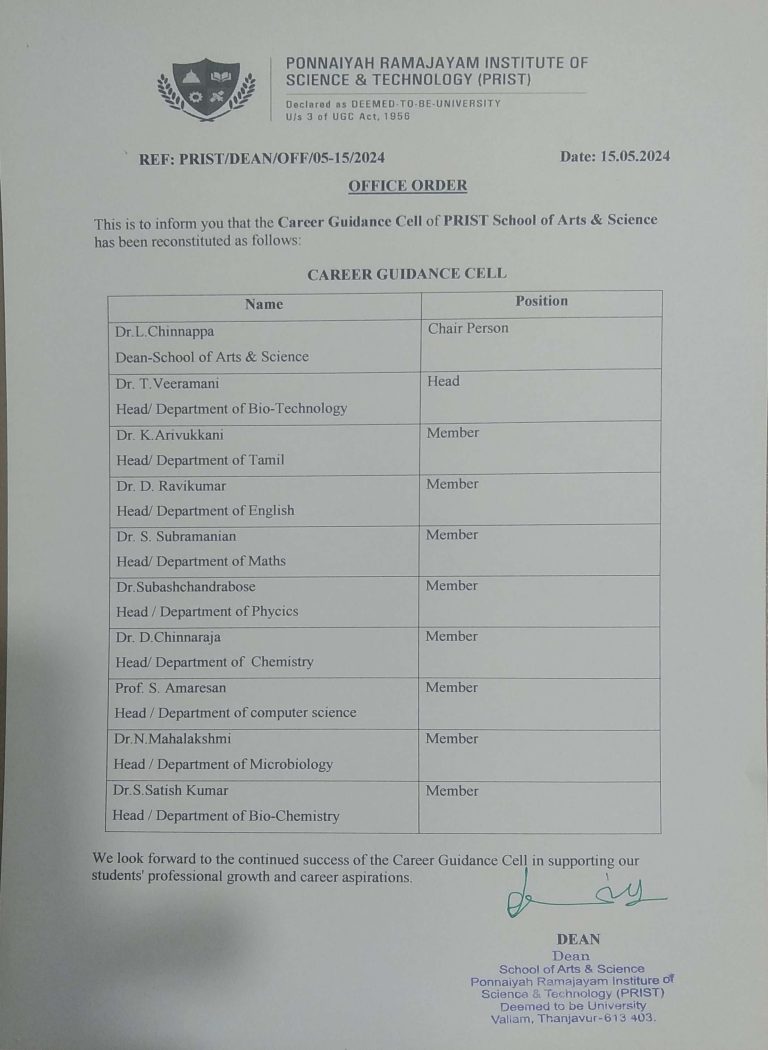
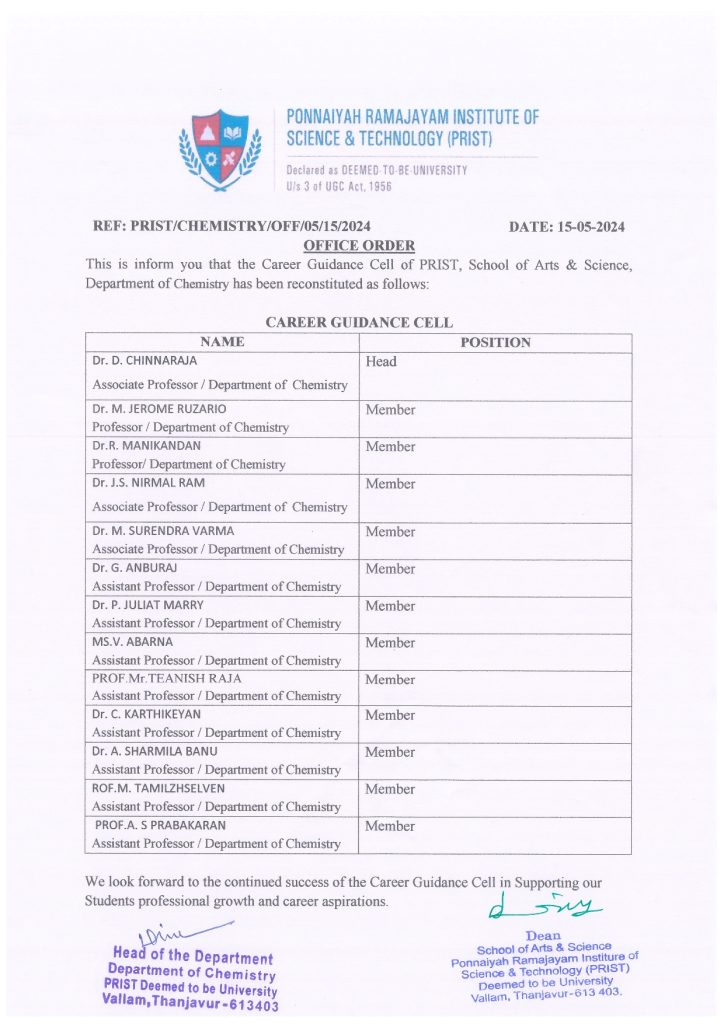
- Cultural Fest on “Chem-Fest 2024” held on 16.04.2024, organized by the Department of Chemistry.
- Technical Fest on “Chemistry Department Technical Fest-24” held on 16.04.2024, organized by the Department of Chemistry.
- Career Counseling Program on “Formulae for Success” held on 20.03.2024, organized by the Department of Chemistry.
- Soft Skills Program on “Employability Skills Program” held on 07.03.2024, organized by the Department of Chemistry.
- Competitive Examination Guidance Program on “Success to TNPSC” held on 05.02.2024, organized by the Department of Chemistry.
- Awareness of Trends and Technology Program on “A Curated List of Cheminformatics Software and Libraries” held on 26.10.2023, organized by the Department of Chemistry.
- Career Counseling Program on “Higher Education in India: Challenges and Opportunities” held on 19.10.2023, organized by the Department of Chemistry.
- Club Activities Program on “Graduate Student Interdisciplinary Research Club (GSIRC)” held on 17.10.2023, organized by the Department of Chemistry.
- Soft Skills Program on “Communication Skills and Interview Techniques” held on 04.09.2023, organized by the Department of Chemistry.
- Language & Communication Skills Program on “Writing an Article for the Press” held on 29.08.2023, organized by the Department of Chemistry.
- Language & Communication Skills Program on “Trends in Communication” held on 29.08.2023, organized by the Department of Chemistry.
- Life Skills Program on “Workshop on Reference Management Using Mendeley Cite with Microsoft Office 365” held on 30.08.2023, organized by the Department of Chemistry.
- Competitive Examination Guidance Program on “SET and NET Coaching for Success” held on 22.08.2023, organized by the Department of Chemistry.
- Life Skills Program on “Analytical Chemistry: Data Analysis” held on 15.03.2023, organized by the Department of Chemistry.
- Special Seminar on ‘Nanoscience’ 1st November 2022 at PRIST Deemed to be University, Thanjavur.
- Seminar on ‘Concepts in Bioinorganic Chemistry’ 5th May 2022 at PRIST Deemed to be University, Thanjavur.
- Webinar on ‘Supramolecular Chemistry: Analytical methods and biomedical applications’ 24th April 2021 at PRIST Deemed to be University, Thanjavur.
- Webinar on ‘Corrosion and its Mitigation Strategies: Fundamental Aspects and Recent Approaches’ 13th April 2021 at PRIST Deemed to be University, Thanjavur.
- Hands on Training on ‘X-ray Crystallography and Interpretation’ on 22/09/2019 at PRIST Deemed to be University, Thanjavur.
- International Conference on Advanced Chemical and Structural Biology – ICACSB-2019 between 19th to 21st February 2019 at PRIST Deemed to be University
- Summer School on ‘Drug Discovery and Development’ during 16th – 20th July 2018 at PRIST Deemed to be University, Thanjavur.
- Lecture-cum-Workshop on ‘Interpretation of Spectral, Chromatographic, Crystallographic, Computational data of Chemical systems’ January 28-30, 2016. Jointly organized by PRIST University and IICPT, Thanjavur, Tamil Nadu.
Head, Department of Chemistry, School of Arts and Science,
PONNAIYAH RAMAJAYAM INSTITUTE OF SCIENCE & TECHNOLOGY(PRIST), Vallam, Thanjavur -613403.
Email:
hodchemistry@prist.ac.in
Phone:
04362-265021

